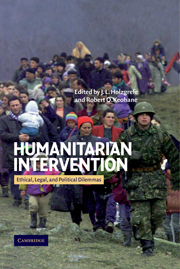Book contents
- Frontmatter
- Contents
- List of contributions
- Acknowledgments
- Introduction
- PART I The context for humanitarian intervention
- PART II The ethics of humanitarian intervention
- PART III Law and humanitarian intervention
- 5 Changing the rules about rules? Unilateral humanitarian intervention and the future of international law
- 6 Interpretation and change in the law of humanitarian intervention
- 7 Rethinking humanitarian intervention: the case for incremental change
- PART IV The politics of humanitarian intervention
- Select English language bibliography
- Index
7 - Rethinking humanitarian intervention: the case for incremental change
Published online by Cambridge University Press: 27 July 2009
- Frontmatter
- Contents
- List of contributions
- Acknowledgments
- Introduction
- PART I The context for humanitarian intervention
- PART II The ethics of humanitarian intervention
- PART III Law and humanitarian intervention
- 5 Changing the rules about rules? Unilateral humanitarian intervention and the future of international law
- 6 Interpretation and change in the law of humanitarian intervention
- 7 Rethinking humanitarian intervention: the case for incremental change
- PART IV The politics of humanitarian intervention
- Select English language bibliography
- Index
Summary
For years to come, NATO's military intervention in Kosovo will shape international attitudes towards the use of force in response to human rights atrocities. In contrast to US military action in Afghanistan in self-defense against terrorist attacks or UN-authorized interventions in Haiti, Bosnia, and Somalia, the legal basis for NATO's intervention in Kosovo remains contested. NATO's action and its aftermath are, in many respects, the latest development in a long-standing historical debate over “humanitarian intervention.” Whether the use of force for humanitarian purposes is lawful or otherwise justified in the absence of state consent or United Nations authorization is a question that has long vexed international lawyers and philosophers. What makes the Kosovo case exceptional is the extent to which this question has transcended the pages of scholarly journals and become a preeminent focus of diplomatic discourse and public debate.
UN Secretary-General Kofi Annan made the issue of intervention the centerpiece of his address to the UN General Assembly in September 1999. He focused on the tragic dilemma confronting the international community when the UN Charter's rules regarding the lawful use of force are in tension with human rights imperatives in concrete situations such as Kosovo. On the one hand, as Annan has stressed, military intervention without Security Council authorization may erode the legal framework governing the use of force and undermine the Council's authority by setting potentially dangerous precedents.
- Type
- Chapter
- Information
- Humanitarian InterventionEthical, Legal and Political Dilemmas, pp. 232 - 272Publisher: Cambridge University PressPrint publication year: 2003
- 14
- Cited by



